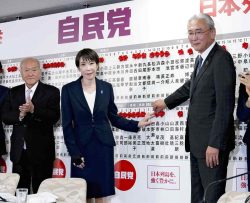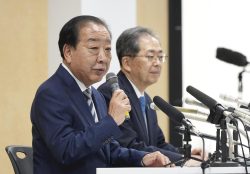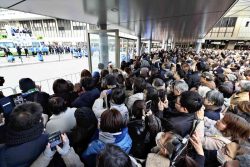Former Komeito leader: More Japan lawmakers rely on swing votes under current election system

Akihiro Ota
10:57 JST, June 23, 2021
This is the third installment of a series reflecting on the 25 years since the single-seat constituency system was introduced. The following are excerpts of an interview with former Komeito leader Akihiro Ota.
***
The Yomiuri Shimbun: What problems have you seen with the single-seat constituency system for the House of Representatives over the past 25 years?
Ota: The single-seat constituency system is mainly intended for voters to choose the governing administration, based on policies and political parties. The current election system was created by combining single-seat constituencies with proportional representation, which can be a receptacle for diverse public opinion. Twenty-five years after its introduction, the system has taken root to a certain extent.
But it can’t be said that choosing candidates under the current election system has made voters particularly interested in policies. In addition, we still have the problem of politics and money, which we had hoped would be resolved.
In particular, the individual characteristics of politicians have disappeared, because the election system has focused on political parties. There are therefore many lawmakers who came to rely heavily on floating votes [without making much effort in their election campaigns].
Their ties with voters also tend to be weak. A senior lawmaker of the [ruling] Liberal Democratic Party called young lawmakers who can’t become rooted in their constituencies “artificial lawn lawmakers.”
Q: Did the single-seat constituency system lower the quality of lawmakers?
A: It’s not just the fault of the election system. But I always say, “In constituencies, there’s air, there’s smell, there’s priorities.” Politics is not aerial warfare but the power to feel something important while interacting with local voters. It’s thorough realism, and flexible wisdom. It’s very important to experience the issues directly on the front line.
Politicians are asked to deal with three “Ss” — seikyoku (political situations), seisaku (policies) and senkyo (elections). Elections are especially important. They move around in their constituencies because they need to be strong in elections. Battling to win elections trains them as politicians. Whether they can improve their radar and dynamic visual acuity to feel the changes in the times and sense the movement of public opinion is an integral part of being a politician.
However, the single-seat constituency system is something like a popularity contest, and candidates tend to be selected based on their higher likelihood for winning elections, rather than their strength of character or ability to execute policies. Politicians are always being tested over their ability to resist the temptation of populism and the genie of power. I think if they can establish a footing in their constituencies, that will help resolve populism, at least in the sense of pandering to public opinion.
Q: Under the single-seat constituency system, small and medium-sized political parties struggle to win seats.
A: The current system, which supports large parties, is a hard one for small and medium-sized parties, from the third-biggest party on down. Komeito has suffered from this directly. It won 51 seats in 1993 under the multiple-seat constituency system, but the figure has stayed at around 30 since 1996, when the single-seat constituency system was introduced. In the previous lower house election in 2017, it was 29 seats.
More effort is needed for Komeito to win seats under the single-seat constituency system. With a party approval rating of about 4%, Komeito must secure nearly 50% of votes in order to win a seat. Compared to the LDP, which has an approval rating of 30% to 40%, Komeito has to work a lot harder.
In any event, Komeito needs the backing of not only its original base, but also supporters of the LDP and the residents of entire communities. Therefore, I have campaigned in elections by making clear my positions as a joint candidate fielded by both the LDP and Komeito, and a representative of the region.
I walk around my constituency with the change in seasons. I attend 300 New Year parties given by local people during the New Year season. When the cherry trees blossom, I appear at places where people gather.
I also move around through the whole year, going to summer festivals and Bon festival dance events, cultural festivals and athletic meets in autumn, and rice-cake pounding events in winter. When I was a cabinet member and even after losing an election, I actively attended these events by local people all the year round in the same manner.
At first, I was not accepted even at meetings for local residents. It takes at least 10 years to earn a position as a representative of the region. A politician should be a person who can pay attention to details.
Q: How should the current election system be corrected?
A: At the stage of the draft bill, 250 seats each were allocated for the single-seat constituencies and proportional representation. When the bill passed into law, however, the number was 300 for single-seat constituencies and 200 for proportional representation.
Currently there are 289 for single seats and 176 for proportional representation. Proportional representation seats have been decreasing. I think it’s important to create a system that attaches more importance to proportional representation, as it reflects public opinion like a mirror.
The Adams’ [seat-allocation] method will be applied to the lower house from the election after next on, and there are plans to rezone electoral districts. If this continues, the number of lawmakers in Tokyo and other major cities will increase more and more in proportion to their population, while lawmakers from regional areas will decrease.
Lower house lawmakers are members of the House of “Representatives,” so lawmakers representing regional areas are important. It will become necessary to hold discussions to drastically review the current election system.
—The interview was conducted by Yomiuri Shimbun Staff Writer Hiroyuki Doi.
Adams’ method
A formula for allocating electoral seats, designed to ensure that the size of each constituency’s population is better reflected in the number of seats assigned to that area. In single-seat constituencies in the lower house, the population of each prefecture is divided by an X figure, and the numbers after the decimal point will be rounded up to an integral number. The result is the number of seats to be allocated to that prefecture. The method is based on a formula believed to have been proposed by John Quincy Adams, the sixth president of the United States. It will be applied to lower house elections based on the results of the 2020 national census.
Akihiro Ota, Former Komeito leader
Ota, 75, graduated from Kyoto University’s graduate school. In 1993, he was elected for the first time to the House of Representatives from former Tokyo Constituency No. 9. After that, he was elected under the proportional representation system. Since 2003, he has been elected to Tokyo Constituency No. 12. Ota has served as transport minister and Komeito leader. After the 2009 lower house election, he resigned as party leader to take responsibility for the complete defeat of all party candidates in single-seat constituencies, including himself. He returned to national politics in 2012 and has been serving as a lower house member. Ota has been elected to the lower house eight times in total.
Top Articles in Politics
-

Japan PM Takaichi’s Cabinet Resigns en Masse
-

Sanae Takaichi Elected 105th Prime Minister of Japan; Keeps All Cabinet Appointees from Previous Term
-

Japan’s Govt to Submit Road Map for Growth Strategy in March, PM Takaichi to Announce in Upcoming Policy Speech
-

LDP Wins Historic Landslide Victory
-

LDP Wins Landslide Victory, Secures Single-party Majority; Ruling Coalition with JIP Poised to Secure Over 300 seats (UPDATE 1)
JN ACCESS RANKING
-

Japan PM Takaichi’s Cabinet Resigns en Masse
-

Japan Institute to Use Domestic Commercial Optical Lattice Clock to Set Japan Standard Time
-

Israeli Ambassador to Japan Speaks about Japan’s Role in the Reconstruction of Gaza
-

Man Infected with Measles Reportedly Dined at Restaurant in Tokyo Station
-

Man Infected with Measles May Have Come in Contact with Many People in Tokyo, Went to Store, Restaurant Around When Symptoms Emerged




















